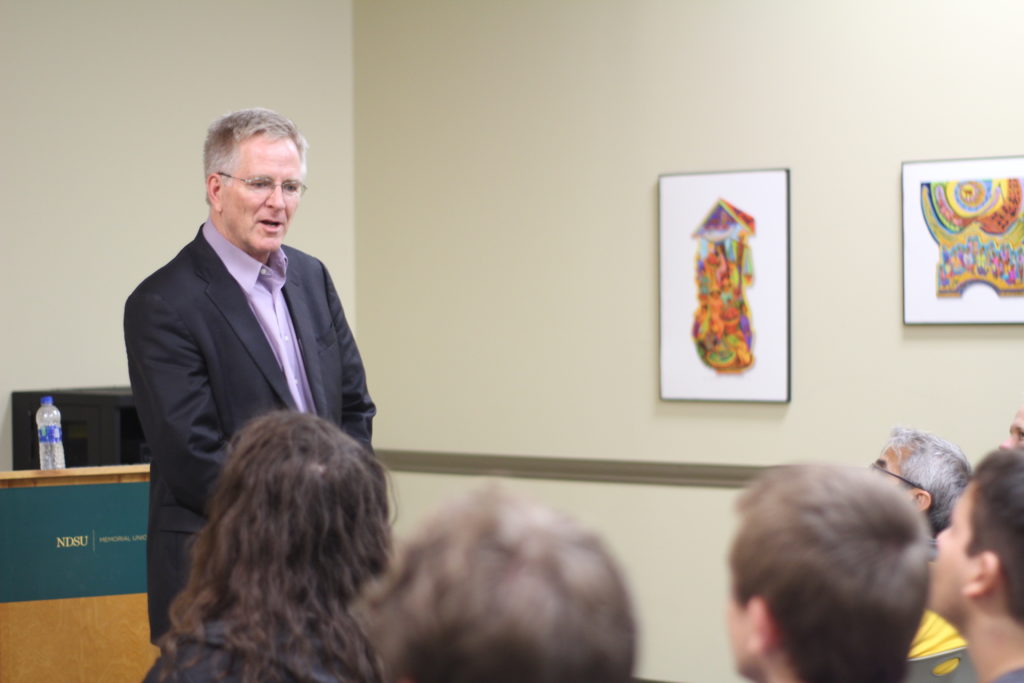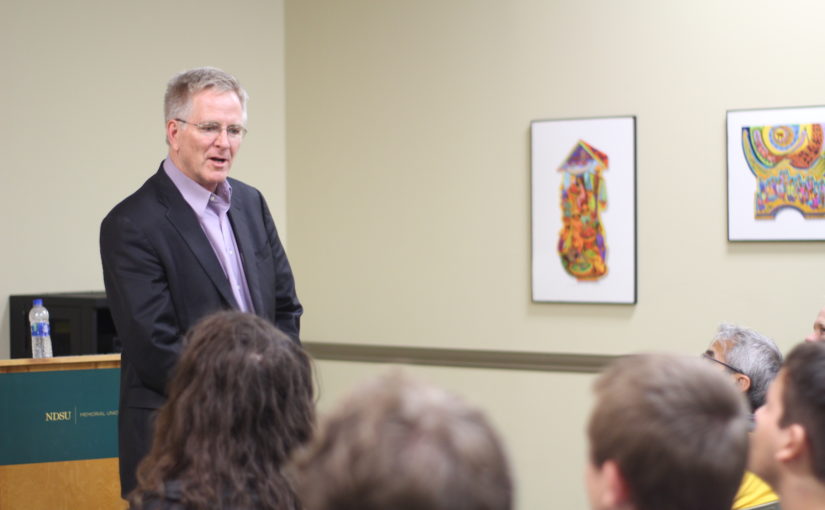
Steves addresses NDSU.
Rick Steves, a prominent PBS travel host and a board member for the National Organization for the Reform of Marijuana Laws, spoke to the North Dakota State community on Friday, Oct. 5.
Steves, who has spent 20 years in Europe focusing on drug policy and was a spokesperson for drug reform in Washington state in 2012, advocates primarily for treating the conversation surrounding the legalization of recreational marijuana to be looked at through the lens of education, not criminal activity.
“You can’t legislate morality,” Steves said, expanding to say that people are going to smoke marijuana whether or not it’s legal. The question is, how do we as a democracy deal with that? Steves advocates for what he called “pragmatic harm reduction,” using the example of clean needles for an extremely low cost available in other countries to prevent the spread of intravenous diseases like HIV/AIDS between intravenous drug users.
He also said that while people believe legalization will increase marijuana use, historically it has not in any country or state. “Anyone who wants to smoke pot does,” Steves said, noting that people who choose to use marijuana will whether or not it is legal, no matter the repercussions.
In fact, Steves told the audience people use more marijuana in the United States than in Europe despite European countries having decriminalized and in some places legalized the drug.
He noted the concept of legalizing recreational marijuana is not new or groundbreaking, and the best way to lose control of marijuana use in the community is to keep it illegal. In contrast, legalizing it would allow the state to control and regulate the substance.
“You can’t legislate morality,” – Rick Steves
To highlight some of the ways other countries approach marijuana, Steves cited a few examples he had found in his travel days.
According to Steves, the Dutch use the coffee shop system, where shops intended for marijuana usage are scattered around the country and people can go in and get something to take the edge off. However, there is a caveat: the shops cannot advertise to the public.
The shops cannot even have menus of what is available in plain view. Steves shared that in one of the shops he visited, patrons had to press a button to make the menu illuminate, and nobody could press the button for you. This forced people to choose to engage in the behavior of using marijuana, entirely coercion-free.
In Spain, the selling of cannabis is strictly prohibited, but it can be grown. Steves said because nobody wants to grow their own plant only to dry it and smoke it, people join cannabis clubs.
People pay fees to join these clubs, and as a result they get to use the product the club grows for free.
Steves said the laws in the Netherlands and Portugal surrounding marijuana emerged in both countries from an opioid problem the countries were facing. The governments essentially decided they had bigger problems than marijuana, so they decriminalized it and focused on the problem — opioids.
From there, the countries took a compassionate approach to drug addiction, treating those addicted as sick people, not criminals.
Another motivator for Steves is the institutionalized racism that is sewn into drug laws, leading to the targeting of people of color. In the U.S. alone, Black and Latinix populations account for 57 percent of the prison population despite accounting for only about 32 percent of the general population, according to the U.S. Census.
Steves said that through his experience and research, he has seen the legalization of marijuana result in better civil liberties for all and increased tax revenue.
In his talk, he told listeners that if they are only talking to people who already agree with them, then they will not see the progress they pursue.
His message to young voters is for them to understand that they “will inherit the world,” stating they should vote in the upcoming midterms to ensure the world they want is the one they get. He also stated that if citizens do not vote, they cannot complain about the outcome.
